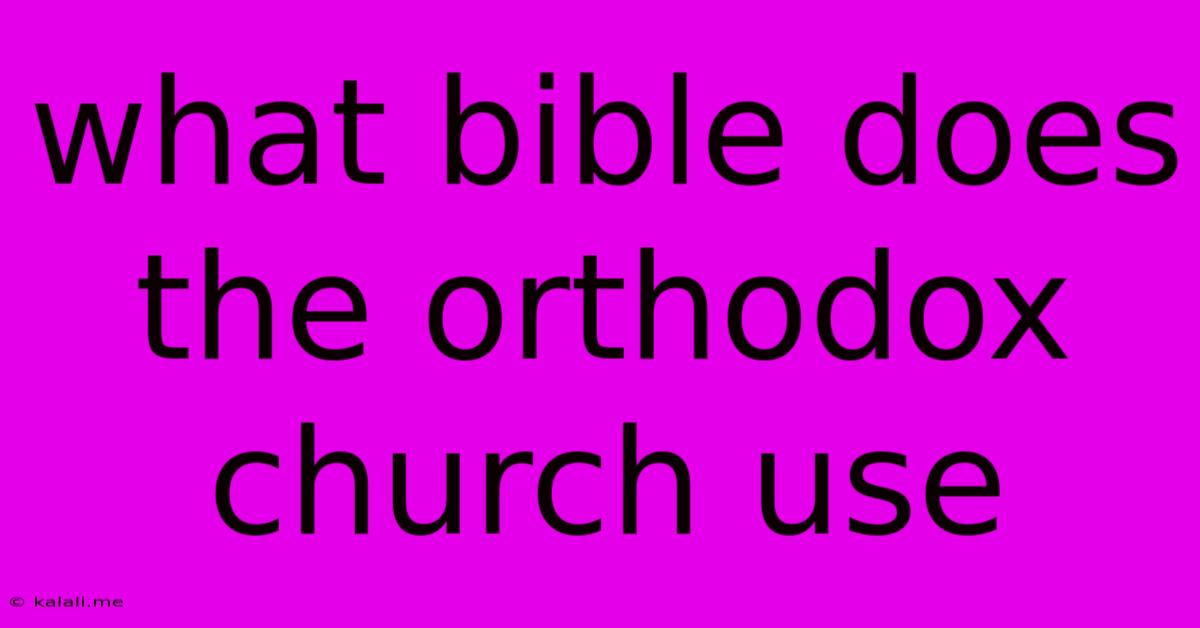What Bible Does The Orthodox Church Use
Kalali
Jun 07, 2025 · 3 min read

Table of Contents
What Bible Does the Orthodox Church Use?
The Orthodox Church uses a variety of Bibles, but they all stem from the same ancient textual tradition and generally share the same books. Understanding the nuances of the Orthodox approach to Scripture requires looking beyond a simple answer like "the Septuagint." This article will delve into the complexities of the Orthodox Bible, exploring its history, variations, and significance within the Orthodox faith.
The most concise answer is that the Orthodox Church primarily utilizes the Septuagint (LXX), an ancient Greek translation of the Hebrew Bible. However, the reality is more nuanced than this simple statement suggests. The Septuagint, created centuries before Christ, holds a unique and venerated position in Orthodox tradition. It is considered by many to be the Bible par excellence, influencing the understanding and interpretation of scripture for centuries.
The Importance of the Septuagint in Orthodox Christianity
The Septuagint's importance stems from several factors:
- Early Church Usage: The early Church Fathers, including those who spoke and wrote in Greek, largely relied on the Septuagint. This established its foundational role in the development of Christian theology.
- Old Testament Texts: The Septuagint includes books not found in the Hebrew Bible (the Masoretic Text), often referred to as the Deuterocanonical books. These books—including Tobit, Judith, Wisdom, Sirach (Ecclesiasticus), Baruch, 1 and 2 Maccabees—are considered canonical scripture by the Orthodox Church. This difference in included texts is a key distinction between Orthodox and Protestant Bibles.
- Theological Significance: The Septuagint's wording and interpretations often subtly differ from the Hebrew Masoretic Text. These variations, while sometimes minor, can carry significant theological weight for Orthodox understanding.
Beyond the Septuagint: Other Influences and Translations
While the Septuagint is central, it's crucial to understand that the Orthodox Church doesn't rely solely on a single, monolithic translation. Over time, various editions and revisions of the Septuagint have emerged, reflecting the ongoing engagement with the text. Moreover, modern translations into various languages exist, all aiming to faithfully convey the meaning of the Septuagintal text.
Furthermore, the Orthodox Church also reveres other translations and interpretations of Scripture passed down through Church tradition. The interpretation of scripture isn't solely a matter of the text itself but also relies heavily on Patristic writings and centuries of theological reflection.
The Role of Tradition in Orthodox Biblical Interpretation
Orthodox Biblical interpretation is deeply intertwined with Sacred Tradition. This means that the Church's understanding of scripture is informed not only by the text itself but also by the ongoing life and teaching of the Church throughout history. The Church Fathers' writings, liturgical practices, and conciliar decisions all play a crucial role in shaping how the Orthodox Church understands and applies the Bible.
This approach distinguishes the Orthodox understanding of scripture from other Christian denominations. The emphasis on Tradition provides a holistic approach to interpreting the Bible, ensuring that the text is understood within its historical and theological context.
Conclusion: A Living Tradition, A Living Text
In summary, the Orthodox Church doesn't use a single, easily defined "Bible" in the same way some other denominations do. The Septuagint forms the core of their Old Testament, encompassing books not found in other canons. However, the Orthodox approach goes beyond simple translation. Their engagement with Scripture is a rich, dynamic process informed by centuries of tradition, theological reflection, and a deep reverence for the living word of God. This nuanced understanding makes the Orthodox relationship with the Bible far more than just using a specific book; it's a living, breathing tradition of faith and interpretation.
Latest Posts
Latest Posts
-
Usb Loader Gx Game Not Loading
Jun 07, 2025
-
Shes Rolling Her Ass Off Meaning
Jun 07, 2025
-
Have A Great Time In French
Jun 07, 2025
-
How To Wire A Light Switch With Multiple Lights
Jun 07, 2025
-
Can You Bring A Glass On A Plane
Jun 07, 2025
Related Post
Thank you for visiting our website which covers about What Bible Does The Orthodox Church Use . We hope the information provided has been useful to you. Feel free to contact us if you have any questions or need further assistance. See you next time and don't miss to bookmark.